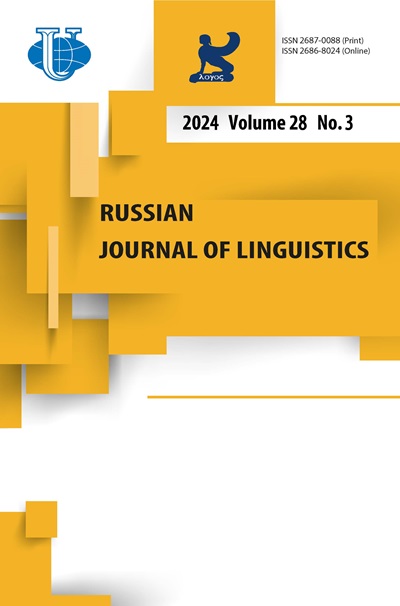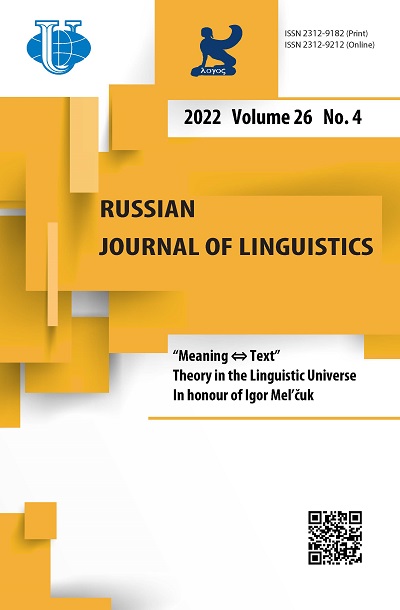Семантическая декомпозиция четырех слов из Корана
- Авторы: Дьюри М.1
-
Учреждения:
- Австралийский национальный университет
- Выпуск: Том 26, № 4 (2022): Теория «Смысл ⇔ Текст» в лингвистической вселенной К юбилею И.А. МЕЛЬЧУКА
- Страницы: 937-969
- Раздел: Статьи
- URL: https://journals.rudn.ru/linguistics/article/view/32951
- DOI: https://doi.org/10.22363/2687-0088-30779
Цитировать
Полный текст
Аннотация
В статье предлагается использовать Естественный Семантический Метаязык (ЕСМ) (Goddard & Wierzbicka 2014, Wierzbicka 2021) для семантической декомпозиции четырех трудных для перевода арабских слов из Корана. Это первое исследование, в котором предлагается экcплицитное семантическое толкование данных ключевых лексем, основополагающих для духовного мировоcприятия почти двух миллиардов последователей ислама в современном мире. Первое рассматриваемое слово - rasūl, называющее посредников, посланных к людям Аллахом, используется в Коране наряду с nabī , имеющим почти то же самое значение. Семантическое толкование лексемы rasūl противопоставляется толкованию библейского nābā’ ‘пророчество’ и nabī’ ‘пророк’. В английском переводе Корана rasūl обычно передается словом ‘messenger’, а nabī - ‘prophet’, однако оба этих перевода не являются адекватными и вводят в заблуждение. Далее анализируются три концепта из Корана, которые передаются различными способами, при этом ни один из них не может считаться удовлетворительным: shirk ‘association’ и kāfir ‘disbeliever’ относятся к двум аспектам неверия, а трудный для перевода глагол ittaqā обозначает ‘осторожное благочестие’. Использование Естественного Cемантического Метаязыка позволяет преодолеть сложности перевода данных лексем на английский язык с помощью их детального толкования с использованием семантических примитивов. Предназначение этих толкований - быть легкодоступными для носителей иных языков, кроме английского.
Ключевые слова
Об авторах
Марк Дьюри
Австралийский национальный университет
Автор, ответственный за переписку.
Email: mdurie@jefferycentre.mst.edu.au
ORCID iD: 0000-0003-2990-0937
австралийский лингвист, богослов и пастор. Является Старшим научным сотрудником Центра им. Артура Джеффери по изучению ислама при Мельбурнской школе теологии, директором-основателем Института духовного самосознания при Австралийском национальном университете
Канберра / Мельбурн, АвстралияСписок литературы
- Adang, Camilla P. 2001. Belief and Unbelief. Encyclopaedia of the Qurʾān 1. 218-226. Leiden: Brill.
- Al-Jallad, Ahmad. 2015. An Outline of the Grammar of the Safaitic Inscriptions. Leiden: Brill.
- Ali, Abdullah Yusuf. 1946. The Holy Qur’an: Translation and Commentary. Birmingham: Islamic Propagation Centre International.
- Arberry, Arthur J. 1998. The Koran Interpreted. Oxford: Oxford University Press.
- Bromhead, Helen & Zhengdao Ye (eds.). 2020. Meaning, Life and Culture. Canberra: ANU Press.
- Cole, Juan. 2020. Infidel or paganus? The polysemy of kafara in the Quran. Journal of the American Oriental Society 140 (3). 615-635.
- Durie, Mark. 2018. The Qur’an and its Biblical Reflexes: Investigations into the Genesis of a Religion. Lanham, MD: Lexington Books.
- Goddard, Cliff. 2014. Have to, Have got to and Must: NSM analyses of English modal verbs of ‘necessity’. In Maite Taboada & Radoslava Trnavac (eds.), Nonveridicality and evaluation: Theoretical, computational and corpus approaches, 50-75. Leiden: Brill.
- Goddard, Cliff & Anna Wierzbicka. 2014. Words and Meanings: Lexical Semantics Across Domains, Languages and Cultures. Oxford: Oxford University Press.
- Habib, Sandy. 2011. Angels can cross cultural boundaries. RASK (International Journal of Culture and Communication) 34. 49-75.
- Habib, Sandy. 2017. The meanings of ‘angels’ in English, Arabic, and Hebrew. In Zhengdao Ye (ed.), The semantics of nouns, 89-119. Oxford: Oxford University Press.
- al-Hilālī, Muḥammad Taqī-ud-Dīn & Muḥammad Muḥsin Khān. 1998. The Noble Qurʾan: The English Translation of the Meanings and Commentary. Madinah: King Fahd Complex.
- Hughes, Aaron W. 2012. Abrahamic Religions: On the Uses and Abuses of History. Oxford: Oxford University Press.
- Hughes, Aaron W. 2022. An Anxious Inheritance: Religious Others and the Shaping of Sunnī Orthodoxy. Oxford: Oxford University Press.
- Izutsu, Toshihiko. 1964. God and Man in the Qurʾan: Semantics of the Qurʾanic Weltanschauung. Tokyo: The Keio Institute of Cultural and Linguistic Studies.
- Izutsu, Toshihiko. 1966. Ethico-Religious Concepts in the Qurʾān. Montreal: McGill University Press.
- Jeffery, Arthur. 1938. The Foreign Vocabulary of the Qurʾān. Baroda: Oriental Institute.
- Jeffery, Arthur. 1950. The Qurʾān as scripture. The Muslim World 40. 41-55, 106-134, 185-206, 257-275.
- Khalifa, Rashad. 1981. Quran: The Final Scripture Authorized English Version. Tucson, AZ: Islamic Productions.
- Levisen, Carstens & Sophia Waters (eds.). 2017. Cultural Keywords in Discourse. Amsterdam: John Benjamins.
- Lewis, Bernard. 2002. What Went Wrong: Western Impact and Middle Eastern Response. New York: Oxford University Press.
- Lewis, Clive Staples. 1940. The Problem of Pain. Glasgow: Collins.
- Marshall, David. 2014. God, Muhammad and the Unbelievers: A Qurʾanic Study. London: Routledge.
- Mel’čuk, Igor. 2018. Anna Wierzbicka, Semantic Decomposition, and the Meaning-Text Approach. Russian Journal of Linguistics 22 (3). 521-538.
- Munshey, Munir. 2016. The Entire Noble Qur’an. Available at answeringchristianity.com.
- Ortega y Gasset, José. 1959. The difficulty of reading. Diogenes 7 (28). 1-17.
- Palmer, Edward Henry. 1880. The Qur’ân. Oxford: Clarendon.
- Pickthall, Marmaduke. 1976. The Glorious Koran: A Bi-Lingual Edition with English Translation, Introduction and Notes. London: Allen & Unwin.
- Reynolds, Gabriel Said. 2018. The Qurʾān and the Bible: Text and Commentary. New Haven: Yale University Press.
- Rodwell, John Medows. 1876. The Koran. London: B. Quaritch.
- Sale, George. 1734. The Koran, Commonly Called the Alcoran of Mohammed, Tr. Into English Immediately from the Original Arabic; with Explanatory Notes, Taken from the Most Approved Commentators. To Which is Prefixed a Preliminary Discourse. London: J. Wilcox
- Shakir, M.H. 1985. The Holy Quran: Arabic Text and English Translation. Beirut: Ets. al-Wafaa
- Wansbrough, John. 1977. Quranic Studies: Sources and Methods of Scriptural Interpretation. Oxford: Oxford University Press.
- Wierzbicka, Anna. 1992. Semantics, Culture and Cognition: Universal Human Concepts in Culture-Specific Configuraations. Oxford: Oxford University Press.
- Wierzbicka, Anna. 1997. Understanding Cultures Through Their Key Words: English, Russian, Polish, German, and Japanese. Oxford: Oxford University Press.
- Wierzbicka, Anna. 1999. Emotions Across Languages and Cultures: Diversity and Universals. Cambridge: CUP.
- Wierzbicka, Anna. 2001. What Did Jesus Mean? Explaining the Sermon on the Mount and the Parables in Simple and Universal Human Concepts. Oxford: Oxford University Press.
- Wierzbicka, Anna. 2014. Imprisoned in English: The Hazards of English as a Default Language. Oxford: Oxford University Press.
- Wierzbicka, Anna. 2019. What Christians Believe: The Story of God and People in Minimal English. New York: Oxford University Press.
- Wierzbicka, Anna. 2020. Addressing God in European languages: Different meanings, different cultural attitudes. Russian Journal of Linguistics 24 (2). 259-293.
- Wierzbicka, Anna. 2021. “Semantic Primitives”, fifty years later. Russian Journal of Linguistics 25 (2). 317-342.
- Wittgenstein, Ludwig. 1958. Philosophical Investigations. trans. G. E. M. Anscombe. 2nd edn. Oxford: Blackwell.
- Adang, Camilla P. 2001. Belief and unbelief. In Jane Dammen McAuliffe (ed.), Encyclopaedia of the Qurʾān, 1. 218-226. Leiden: Brill.
- Ambros, Arne A. & Stephan Procházka. 2004. A Concise Dictionary of Koranic Arabic. Wiesbaden: Reichert.
- Biella, Joan Copeland. 1982. Dictionary of Old South Arabic: Sabaean Dialect. In Frank Moore Cross (ed.), Harvard Semitic Studies 25. Chico, CA: Scholars Press.
- Böwering, Gerhard. 2002. God and his attributes. In Jane Dammen McAuliffe (ed.), Encyclopaedia of the Qurʾān 2, 316-331. Leiden: Brill.
- Hawting, Gerald R. 2002. Idolatry and idolaters. In Jane Dammen McAuliffe (ed.), Encyclopaedia of the Qurʾān 2, 475-480. Leiden: Brill.
- al-Maḥallī, Jalāl al-Dīn & Jalāl al-Dīn al-Suyūṭī. 2007. Tafsīr al-Jalālayn. In Ghazi bin Muhammad bin Talal (ed.). Trans. Feras Hamza. Amman, Jordan: Royal Aal al-Bayt Institute for Islamic Thought.
- Mir, Mustansir. 2004. Polytheism and Atheism. In Jane Dammen McAuliffe (ed.), Encyclopaedia of the Qurʾān 4, 158-162. Leiden: Brill.
- OED Online. http://www.oed.com/ Oxford: Oxford University Press.
- Wright, William. 1896-1898. A Grammar of the Arabic Language. 3rd edn. 2 vols. Cambridge: CUP.

















